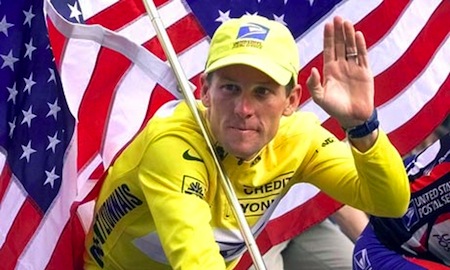By Shane Thomas
People love stories. Particularly tales of greatness. A major reason why this summer's Olympics held Britain in such thrall was the daily accounts of athletes finding the best of themselves. We had yarns such as the woman who grabbed her last chance of glory (Katherine Grainger), the chosen one adored by her public (Jessica Ennis), or the wounded king who ruthlessly crushed those who would usurp him (Usain Bolt). This wasn't just running and jumping. These men and women are the gods of our time.
At least that's what elements the media would have you believe. It's often forgotten that sports journalists started out as fans; people who have been in rapture to great sporting achievement for decades. So it's understandable when they treat something which has no importance as if it's the most important thing in the world. It's because we love stories.
Over 2000 years ago, civilisation had tales of the likes of Odysseus, Zeus, Sisyphus and Achilles; extraordinary tales with a chimeric narrative, produced in order to leave their audiences gasping in awe. While the common day equivalent of this are the tales of superheroes seen in comic books, there has been a trend for propelling successful athletes into a similar milieu. Why have fictional superheroes, when you can watch the real thing every weekend.
Maybe this is linked to the rise of reality TV. After all, sport has always been one of life's greatest reality shows. In the past few months, look at how publicity has followed the likes of Kevin Pietersen, Manti T'eo or Mario Balotelli. The world has recently been glued to its television screens for Lance Armstrong's "confessional" interview with Oprah Winfrey - a "must-see" television event. The Tour de France could only dream of the attention that Armstrong's sit-down with Oprah garnered.
This unslaked thirst for stories means sports stars are now positioned as characters in a rolling TV soap, one that has no end. Can Manchester United quieten the noisy neighbours in the chase for the Premier League title? Can Jose Mourinho survive the mutiny of his players at Real Madrid? Who will win the battle of the Harbaugh brothers at Superbowl XLVII? Be sure to tune in to find out.
There's no doubt that the proliferation of sports coverage makes top-class athletes the closest many of us get to witnessing extraordinary feats on a regular basis. But aligning them in the status of the superhero is unhealthy - for all involved. Sports stars may deserve praise, but heroes they are not.
A lot of the ire that's been directed towards Armstrong is as a result of how much everyone bought into his legend. He beat his opponents, the French mountains, the supercilious treatment of a suspicious written press, and cancer. Who needs Batman when we've got Lance. Now, everyone go out and buy a yellow wristband. To discover that his gains were ill-gotten meant more to us than just a man cheating. Our hero had let us down.
But Armstrong was never a hero. And that's not because he took performance enhancing drugs. Bradley Wiggins isn't a hero either. Nor is Jessica Ennis. Nor is Ellie Simmonds.
Sport has a ruinous tendency to assume what a person does is proof positive of who they are, when the truth is that any link between the two is purely incidental. Roger Federer is viewed as an exemplar of dignity and class. However, his conduct during the 2009 US Open Final suggests otherwise. It's easy to be dignified when you're winning.
This isn't to castigate Federer or any other athlete. Simply to state that they're not gods who float on clouds for us to marvel at. They walk amongst us, complex and multifaceted. They're not here for our entertainment, because sport isn't entertainment. It just happens to be entertaining.
So the next time one of your sporting heroes lets you down, pause for thought, and don't excoriate them. To err is human. And that's all they are. Human. There are no heroes here.
"The Greatest Events in Sporting History" is available to download from http://www.simplysyndicated.com/shows/sportinghistory/, e-mail us at sportshistoryshow@googlemail.com and you can follow us on Twitter @TGEISH

Excellent comments, I think on the whole you are right i think the "common man" (like myself) base so much of our happiness on how these over paid stars perform on a weekly basis. And we base our overall happiness on them and "need" them to perform well which pushes them to want to impress.
ReplyDeleteOverall I agree with your comments.
Don't think our wish to see team perform well has much of an impact. They perform to satisfy their own desire for success, not for us.
ReplyDeleteAnd it's curious how the term "overpaid" get thrown around, when I seldom hear it when talking about musicians or actors. I think there's an underlying resentment towards athletes - especially footballers - for the money they make.